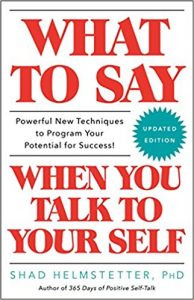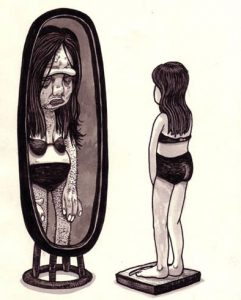By Robine Jean-Pierre
I’ve been reading this book inconsistently for quite some time now. My fiancé Angel read it first, and then he bought a copy for me. He knew that the knowledge inside would have a profoundly positive impact on my life, starting with my self-image. The book is called What to Say When You Talk to Your Self by Dr. Shad Helmstetter, and I may have briefly mentioned it in previous blog posts. With the support of research in neuroscience, the author asserts that the way our brains are wired plays a huge role in determining our success. The primary way to shape our brains (meaning our beliefs, attitudes, feelings, and behavior, successively) is through self-talk.
This does not have to mean literally having conversations with yourself in the mirror or out in public; it has more to do with the things you say about yourself, whether out loud or in your own mind. What you constantly say to or about yourself, you will come to accept and believe, whether it is true or false, good or bad.
Dr. Helmstetter explains that there are five levels of self-talk. Each will be explained in my own words below.
1. The Level of Negative Acceptance
This level consists of statements that start with “I can’t…” “I wish I could…” “I don’t…” and “I’m too…” just to name a few. People say things like “I can’t remember names” because maybe they had one bad experience and forgot someone’s name. They say it constantly because they believe it, but they believe it because they say it constantly. Even if they did want to be good at remembering names, this change would not happen instantly.
When you keep feeding your brain negative directions (“Robine, keep forgetting names since you can’t remember them”) it will follow them indefinitely. That’s why Dr. Helmstetter says this level of self-talk “is the lowest, least beneficial level” that “cripples our best intentions and seduces us into becoming satisfied with mediocrity.”
2. The Level of Recognition–and Need to Change
“I need to…” “I ought to” and “I should” are examples of ways to start a Level 2 self-talk statement. They may sound useful because we all know that recognizing a problem is the first crucial step in solving it. However, they still fall flat because, on their own, they will not push you to find that solution. The truth is that a statement like “I really should start my homework” is an incomplete thought; it is often followed by an unspoken “but” that connects it back to level 1 self-talk: “…but I can’t focus (or I’m too lazy).”
3. The Level of Decision to Change
This is the level where positivity starts to get a foothold. It consists of phrases that begin with “I never…” and “I no longer…” When I first read this section, I found this level particularly interesting because of its usefulness in breaking bad habits, but I thought to myself, doesn’t it seem weird to say I never do something, if I’m still currently doing it? That’s where the question of honesty comes in for me. But again, the brain will accept what it’s told frequently enough, whether it’s true or false, good or bad.
Using an example from the book, if you are trying to quit smoking, saying “I never smoke” every time you light a cigarette is not necessarily lying; it is better to see it as wilfully reprogramming your brain so that you believe it and eventually act it out. I like the idea of speaking as if the goal you want has already been accomplished; the past has a sense of certainty to it.
4. The Level of the Better You
Dr. Helmstetter describes this as “the most effective kind of self-talk we can ever use.” Phrases in this level start with “I am” and end with whatever positive thing you would like to be. If you’re like me, this one might feel uncomfortable at first because you probably aren’t used to it; you might even feel guilty, since it seems too much like boasting or conceit. Fortunately, it’s not. It is simply a matter of telling your brain what you want to be, as if it already is the case. Try saying out loud “I am organized. I always get my assignments done on time. I have great memory.” These instructions to your brain are way more conducive to success than “I can’t stay organized. I wish I could get my assignments done on time. I just can’t remember anything.”
5. The Level of Universal Affirmation
The statements in this level begin with “it is.” Dr. Helmstetter doesn’t explain it too much, but he says that this includes “spiritually oriented affirmations.” These affirmations “speak of a divine affinity of being that transcends our earthly life and gives greater meaning to our existence.” They have been used in ancient religions and may resemble a statement such as “I am one with the universe and it is one with me.”
Getting Started
Dr. Helmstetter recommends replacing levels 1 and 2 with self-talk from levels 3 and 4, as soon as possible. You don’t have to read the whole book to start testing it out. Just know that it takes time and effort to peel back up to years of faulty or undesirable mental programming, in order to replace it with new, positive, healthy programming.
In order to put it to practice right away, here is my personal example of a self-talk program I would like for myself:
I no longer procrastinate. I am organized and focused. I get tasks done on time and I enjoy doing so. I never run away from my responsibilities. When challenges arise, I do whatever it takes to overcome them. I’m positive, enthusiastic, optimistic, and joyful no matter what the circumstances. I am a winner.
All of this information can be found in “Chapter Nine: The Five Levels of Self-Talk” in the book. I hope you found this article helpful, and feel free to leave a reply about what you thought.
Special thanks to Angel again for recommending this book to me.







